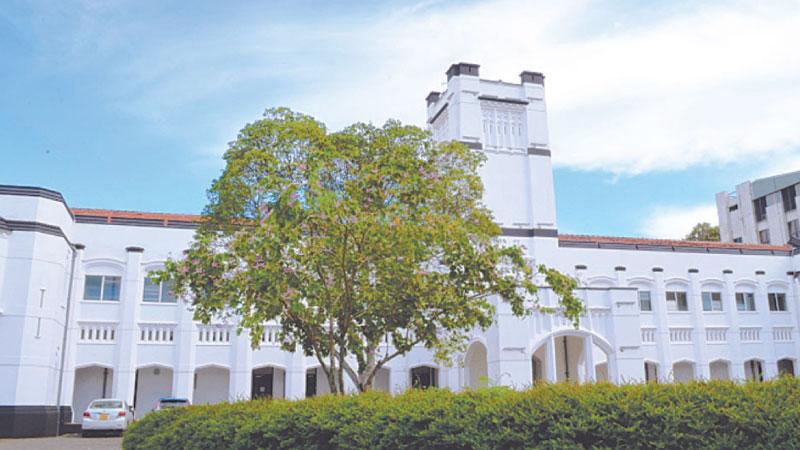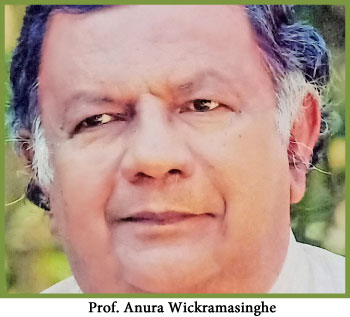
Prof. Anura Wickramasinghe is an instructor in journalism and Sinhala grammarian. Graduated from the University of Peradeniya in 1967, he had obtained his Ph.D. from the Vidyalankara Campus, University of Ceylon in 1976 and had been a university lecturer for 41 years from 1968 to 2009. In 2008, he was appointed Head of the Sinhala Department in the University of Colombo and was a course coordinator in the Journalism Unit at the university. He was the chairman of the Arts Council for ten years and now is acting as a resource person in the media. In an interview with the Sunday Observer, Prof. Wickramasinghe expressed his views on the usage of Sinhala and his contribution as a Professor of Sinhala.
Excerpts
Q: You are known as a grammarian or purist of Sinhala?
A. Yes, but I had been teaching modern literature, including drama at the university for 41 years. I was known as a grammarian after I joined late D.F. Kariyakarawana’s journalism diploma course organised by the Sri Lanka Press Council and the Colombo University journalism diploma course. The more I worked with these courses, the more I came to be known as a purist in language.
But I am not discouraged by them. I like it because I can do so mething for the language through the courses. There are many journalists who consult me on matters of language. Earlier there were many people who came forward to correct the erroneous usage of language, such as D.F. Kariyakarawana, Premachandra Alwis and Hela Haula members.
Q: What are the institutes and courses that you work as a visiting lecturer?
A. The Colombo University’s journalism diploma course, Horana Sri Pali Campus’ graduate course, University of Aesthelics’ graduate course and the Press Council’s journalism course are some of those I work as a visiting lecturer.
Q: The correct usage of language is an issue that will never be resolved. Why?
A. Because the usage of language is subject to change, according to the time. Though it is subject to change, we cannot change it by force. Every language has a correct usage. Correct usage means correct thoughts. Incorrect usage produces distorted thoughts.
There are two language forms in Sinhala which are spoken and written. Mostly, we are worried about the correct usage of written form, not the correct spoken form of language. But these two forms are equally important.
The most valuable resource persons in the correct usage of language are journalists, but unfortunately, today, they are the ones who distort the language.
Some journalists are going to show they are well versed in language by coining new words.
It is not a bad thing to coin new words, but without knowing the linguistic formation of words, coining new words is destructive. For instance, we now say denumwath (දැනුම්වත්) for denuwath (දැනුවත්). But we cannot use ‘mʼ (ම්) with ‘uʼ (උ) ending in Sinhala language, purawata (පුරාවට), numuth (නුමුත්), podihitiya (පොඩිහිටියා), ayawalun (අයවලුන්), Wana alin (වන අලින්), sathun wattha (සතුන් වත්ත) are some of those incorrect words.
And Ma Liyanawa (මා ලියනවා), apa karanu labanawa (අප කරනු ලබනවා) are some of the common incorrect phrases we use. These have to be corrected. We need to follow correct usage if we want to keep the beauty of language.
Q: You don’t seem to write books?
A. Though I have written various articles on Sinhala grammar and reviews on literary books, apart from my Ph.D. thesis, I never felt like writing a book. Writing is a boring, lazy and difficult job to me. Prof. J.B. Dissanayake is a prolific author in the university system. But there are university lecturers like me who don’t write books. Prof. Ratna Wijethunge, late Prof. Tissa Jayawardhane and Prof. A.B. Dissanayake didn’t write books. However, I am working on a book about Sinhala grammar.
Q: Do you have cherished memories in your teaching life in the university?
A. Yes, I have. I acted as the chairman of the Arts Council in the University for over 20 years, during which I organised an inter-faculty drama competition. I could introduce many talented young artistes to the national level through the competition.
The first artist I can recall is Jackson Anthony. I was the senior students’ counsellor at the university for 20 years. During that period, I maintained a healthy relationship between students and the university administration. Once there was a strike by university students. Some lecturers were taken captive by the students. As the students’ counsellor, I went to them to talk. But I was also taken captive by them.
Q: You have students throughout the country, some of whom are university lecturers. But in terms of language fluency or correct usage, most of them are not capable of it. Why?
A. It is due to lack of knowledge. If they learned the language in school or in university, they wouldn’t misuse it. This is about one’s carelessness or lack of attention to the language.
Q: Isn’t there a criterion to estimate the language fluency of assistant lecturers or demonstrators when they join the university?
A. No. There is no such criterion, because lecturers are selected on the final results of the university examinations which are based on factual or logical answers.
Whether they can write correct Sinhala or not, is not a factor or standard in the selection. But we need such a criterion to choose them.
Q: Do you think that the quality of university education has deteriorated?
A. Yes. The main reason is students as well as lecturers do not read and pursue knowledge. They are interested in visual media, such as television, social media and the Internet.
They don’t use libraries adequately. During our time, scholarly books were being published in the university. For example, Sanskrutha Käwya Vichära Müladharma (Principals of evaluation of Sanskrit Poetry) by Hemapala Wijayawardhane, ‘Sinhalese Novelʼ by Ediriweera Sarachchandra, Madya Käleena Sinhala Samäjaya (Medieval Time’s Sinhala Society) by M.B. Ariyapala are some of them. Now, we never encounter such high quality research works.
University lecturers pursue not knowledge, but positions and high salaries. They are not trying to do quality research work, but any work by which they can pass the examination.
Q: Could you recall how you met Prof. Ediriweera Sarachchandra?
A. I met him at the University of Peradeniya in 1963. He was our tutor and lectured us in our second year. I met him for the second time at the University of Colombo when I joined the university as a lecturer in 1968. However, in 1972, he left the university to take up the position as the Sri Lankan Ambassador to France. I began my Ph.D. under his supervision, but couldn’t continue it because of his new post. I completed my Ph.D. under the supervision of Prof. Wimal Dissanayake. Nevertheless, Prof. Sarachchandra helped me a lot in my Ph.D.
